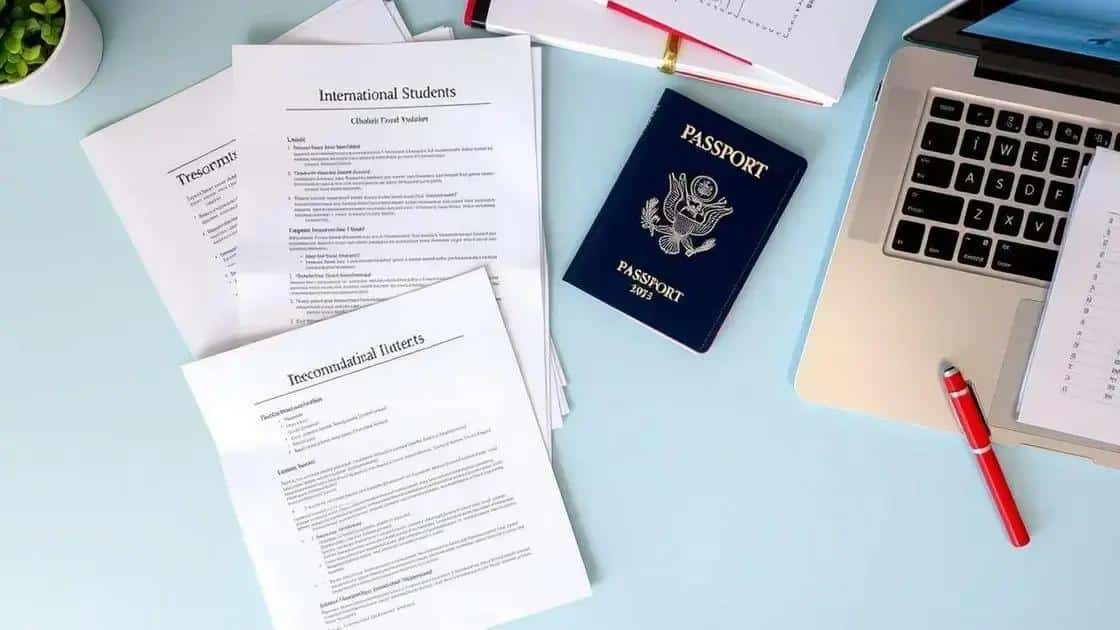International student enrollment: your guide to success

International student enrollment requires essential documents, including academic transcripts, proof of English proficiency, and a personal statement, alongside proactive strategies for cultural adaptation and support network building.
International student enrollment can be an exciting but daunting journey. Have you ever wondered what it takes to study abroad successfully? Let’s explore the essential steps together.
Understanding the application process
Understanding the application process for international student enrollment is crucial for success. It may seem overwhelming, but breaking it down into manageable steps can help. First, research your desired universities and their specific requirements.
Application Timeline
Each institution has its own timeline for applications. Be sure to note deadlines for:
- Submitting application forms
- Providing transcripts and recommendations
- Application fees
- Standardized test scores, if required
Second, prepare all necessary documents early. This includes your academic records, a statement of purpose, and proof of English proficiency.
Types of Applications
Most schools offer different application types, such as:
- Regular decision
- Early decision
- Rolling admissions
Choosing the right type can influence your chances of acceptance. Early decision may give you an advantage but requires commitment. Consider what works best for you!
Once your application is complete, keep track of your submission. Don’t hesitate to check if documents were received. Always follow up!
Overall, patience is key. The process can take time, but being organized will pay off. Keep all communication open and respond promptly to any requests from the university.
Essential documents for international students

When it comes to international student enrollment, having the right documents is essential. Certain paperwork is required to ensure a smooth application process. Gathering these documents early can save you time and reduce stress.
Key Documents
Here are the most essential documents you will need:
- Academic transcripts: These show your previous education.
- Proof of English proficiency: Tests like TOEFL or IELTS may be necessary.
- Letters of recommendation: These should come from teachers or employers who can vouch for your abilities.
- Personal statement: This is your chance to express why you want to study and what you hope to achieve.
In addition to these documents, you may need to provide a copy of your passport and any relevant visa forms. Make sure your documents are up-to-date and clearly presented.
Medical Records
Some universities also require medical records, including vaccinations. Verify what is needed so you can prepare these documents in advance.
Organizing your documents neatly is equally important. A well-organized application can impress admissions officers. Use folders or files to keep everything in one place, making it easy to access when required.
Lastly, always have copies of your documents. This can be helpful in case anything gets lost during the application process.
Common challenges and how to overcome them
When pursuing international student enrollment, many face common challenges that can be daunting. Being aware of these hurdles and knowing how to tackle them is vital for a smooth experience.
Language Barrier
One of the most significant challenges is the language barrier. Communicating in a new language can be tough, especially in academic settings. Consider joining language classes or using apps to improve your skills before you arrive. Practicing with native speakers can also help boost your confidence.
Cultural Adjustment
Adapting to a new culture is another hurdle. You may feel lonely or homesick initially. To ease this transition, immerse yourself in campus life, join clubs, or volunteer. Meeting other international students can create a supportive community.
Financial Management
Budgeting and managing finances is crucial as an international student. Many students struggle with understanding costs or currency exchanges. Make a detailed budget for your monthly expenses, including rent, food, and travel. Always keep track of your spending.
Academic Pressure
Academic expectations can be different from what you are used to. The pressure to perform well can feel overwhelming. Don’t hesitate to seek help from academic advisors or join study groups for additional support. Using campus resources effectively can make a significant difference.
Lastly, remember that it’s okay to reach out for support. Universities often have resources such as counseling and student services to assist you. Staying connected with family and friends can also provide the emotional backing you need.
Tips for adapting to life abroad

Adapting to life abroad as an international student can be both exciting and challenging. With the right strategies, you can make this transition smoother. Embracing new experiences is key to enjoying your time in a different country.
Build a Support Network
Start by building a support network. Connect with fellow students, both local and international. Joining clubs or activities helps you meet new people with similar interests. Don’t hesitate to reach out to student organizations that are focused on helping international students.
Embrace the Culture
Embracing the local culture can enhance your experience. Take opportunities to explore the city, try the food, and attend local events. You’ll learn more about society and make lasting memories. Understanding cultural differences improves communication and helps you blend in.
Stay Organized
Keep your schedule organized. Balance your study time and social activities. Using planners or apps can help you manage your time effectively. Prioritize tasks to avoid feeling overwhelmed.
Staying connected with family and friends back home is also important. Regular video calls can provide emotional support and alleviate feelings of homesickness. Make it a routine to share experiences with them.
Be open-minded about challenges. Mistakes are part of learning, and they can lead to personal growth. Cultivating a positive attitude will help you tackle difficulties with resilience.
FAQ – Common Questions About Adapting to Life Abroad
What should I do if I feel homesick?
Stay connected with family and friends through regular calls and explore local communities to make new friends.
How can I improve my language skills quickly?
Consider joining language classes, practicing with native speakers, and using language apps for daily practice.
What are some effective ways to manage my finances as an international student?
Create a budget, track your expenses, and research cost-saving measures like student discounts.
How can I get involved on campus?
Join student organizations, clubs, or volunteer opportunities to meet new people and enhance your experience.






